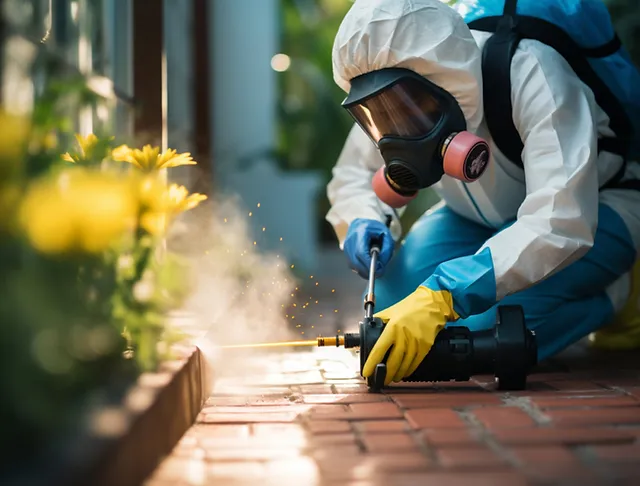Pest control is an essential aspect of maintaining a healthy and comfortable living environment. In Vancouver, the mild climate and lush surroundings create ideal conditions for various pests to thrive throughout the year. This comprehensive guide will delve into the most common pests in Vancouver, seasonal challenges, and effective solutions to keep your home pest-free.
Understanding the Pest Landscape in Vancouver
Before diving into seasonal strategies, it’s crucial to understand the types of pests that commonly invade Vancouver homes. The city’s unique climate allows for a diverse range of pests, including:
Rodents: Rats and mice are prevalent, particularly in urban areas.
Ants: Different species, including carpenter ants and pavement ants, can be problematic.
Cockroaches: German and American cockroaches are common in various environments.
Spiders: While many spiders are harmless, some can become a nuisance.
Termites: Particularly in older homes, termites can cause significant damage if left unchecked.
Wasps and Bees: These insects can become aggressive during the summer months.
Each season presents unique challenges and considerations for pest control.
Spring: Preparing for Pest Season
As winter recedes, pests become more active, seeking food and nesting sites. Here’s how to prepare:
Common Spring Pests
Ants: As the weather warms, ants emerge from hibernation. They start looking for food and can invade kitchens and pantries.
Rodents: Mice and rats often seek shelter in homes as they reproduce in warmer weather.
Termites: Spring marks the beginning of swarming season for termites.
Prevention Strategies
Seal Entry Points: Inspect your home for cracks and holes. Seal any gaps around doors, windows, and foundations to prevent pest entry.
Clean Up: Ensure that food is stored in airtight containers. Regularly clean crumbs and spills to eliminate food sources.
Yard Maintenance: Trim back bushes and trees that touch your home, and remove debris where pests can hide.
Professional Pest Control
If you notice signs of an infestation, such as trails of ants or droppings from rodents, consider hiring a professional pest control service. They can provide targeted treatments and long-term solutions.

Summer: Managing High Pest Activity
Summer brings warmth, which increases pest activity. Homeowners must remain vigilant.
Common Summer Pests
Wasps: Nests can be found in eaves, attics, and trees, leading to aggressive encounters.
Mosquitoes: Stagnant water sources become breeding grounds for mosquitoes.
Cockroaches: They thrive in warm, humid conditions, often invading kitchens and bathrooms.
Prevention Strategies
Eliminate Standing Water: Regularly check for and remove any standing water from your property to reduce mosquito breeding sites.
Wasp Control: If you find a wasp nest, contact professionals for removal. Avoid trying to remove it yourself, as wasps can be aggressive.
Indoor Maintenance: Keep indoor areas dry and well-ventilated to deter cockroaches and other pests.
Natural Remedies
For those seeking eco-friendly solutions, consider using natural repellents. Essential oils like citronella, eucalyptus, and peppermint can deter mosquitoes and other insects when diluted and used in sprays.
Fall: Preparing for Winter
As temperatures drop, pests begin seeking shelter in homes, making fall a critical time for pest control.
Prevention Strategies
Inspect and Repair: Conduct a thorough inspection of your home for any new entry points. Pay particular attention to basements, attics, and crawl spaces.
Store Food Properly: Ensure that pantry items are sealed, and pet food is stored securely.
Outdoor Cleanup: Rake leaves and clear away debris from your yard, reducing hiding spots for pests.
Professional Inspections
Consider scheduling a professional pest inspection in the fall. Experts can identify potential problem areas and provide preventive treatments before pests invade.
Winter: Dealing with Indoor Pests
While many pests become dormant in winter, some, like rodents and certain insects, remain active indoors.
Common Winter Pests
Rodents: Mice and rats are notorious for seeking warmth and food during the cold months.
Cockroaches: They can survive in homes year-round, especially in warmer areas like kitchens.
Prevention Strategies
Maintain Warmth: Keep indoor spaces warm and dry, but avoid creating excess humidity, which can attract pests.
Regular Checks: Check for signs of rodent activity, such as droppings or gnaw marks, particularly in kitchens and storage areas.
Use Traps: If you suspect a rodent problem, set traps in areas where you notice signs of activity.
Emergency Pest Control
If you experience a significant infestation during winter, don’t hesitate to call in professionals. Quick action can prevent further damage and health risks.
Integrated Pest Management (IPM)
A holistic approach to pest control is crucial for long-term success. Integrated Pest Management (IPM) combines various strategies to manage pest populations effectively while minimizing risks to people and the environment.
Key Components of IPM
Monitoring: Regularly inspect your property for signs of pests. This includes traps, visual inspections, and tracking pest activity.
Identification: Properly identify pests to determine the best control methods. Not all pests require the same treatment.
Preventive Measures: Focus on prevention through sanitation, exclusion, and habitat modification.
Control Methods: Use a combination of biological, cultural, physical, and chemical controls as needed. Always prioritize non-toxic methods.
Eco-Friendly Pest Control Options
With growing concerns about environmental impact, many homeowners are seeking eco-friendly pest control solutions. Here are some options:
Natural Predators: Encourage beneficial insects and animals that prey on pests, such as ladybugs or birds.
Organic Pesticides: Use organic or natural pesticides that are less harmful to the environment.
Diatomaceous Earth: This natural powder can deter and kill various pests, including ants and cockroaches, without harmful chemicals.
When to Call a Professional
While many pest issues can be managed with DIY solutions, certain situations warrant professional intervention:
- Severe Infestations: If you have a large infestation that is difficult to manage.
- Health Risks: Pests that pose health risks, such as rodents or cockroaches, require immediate action.
- Structural Damage: If pests are causing damage to your home, such as termites, professional help is essential.
Conclusion
Pest control in Vancouver requires a proactive approach tailored to each season’s unique challenges. By understanding the local pest landscape and implementing effective prevention and control strategies, homeowners can maintain a pest-free environment year-round. Remember that integrated pest management and eco-friendly options are not only effective but also contribute to a healthier ecosystem. Whether you choose to tackle pest issues on your own or enlist the help of professionals, being informed and prepared is key to successful pest control.



